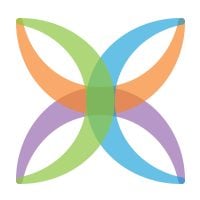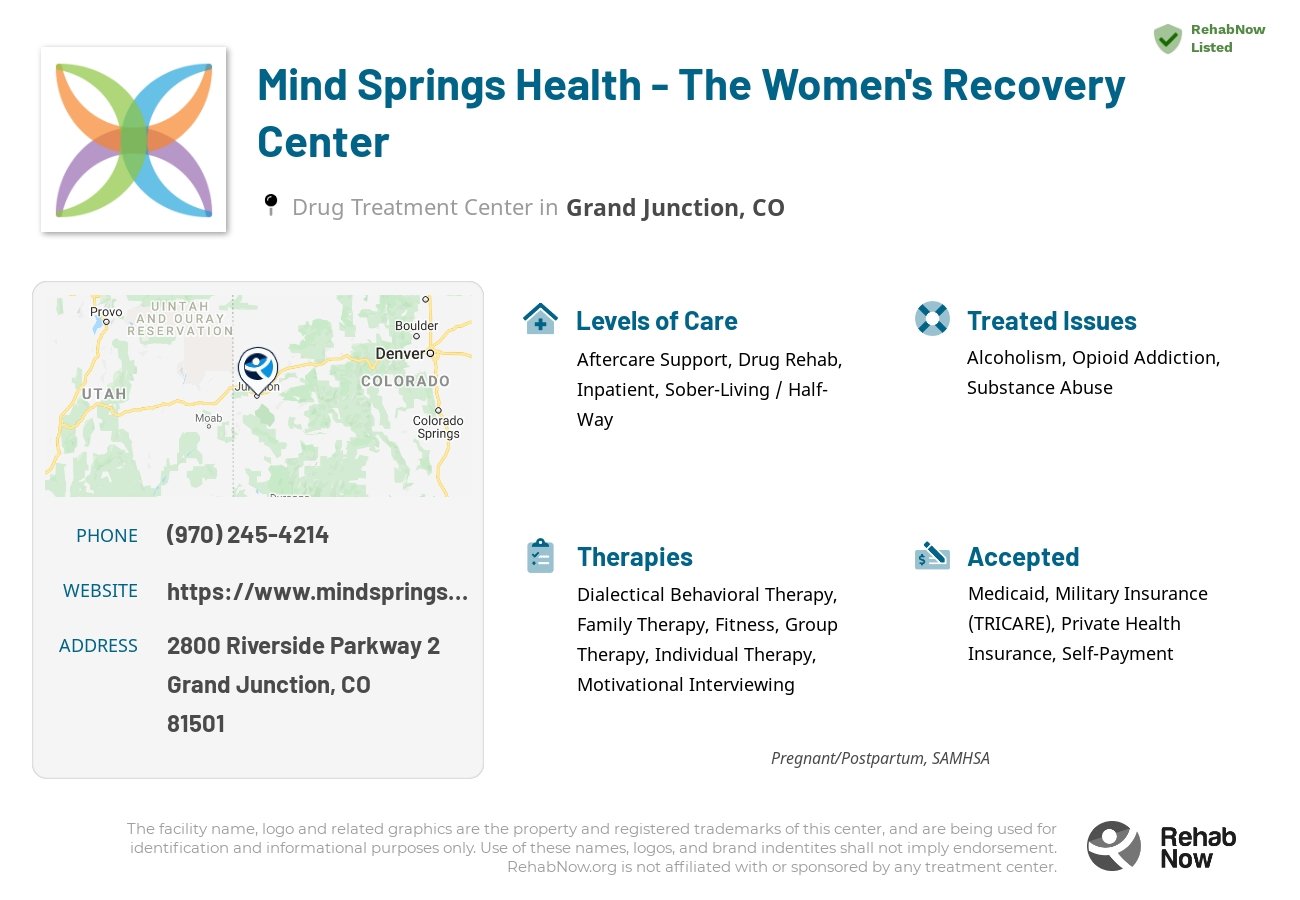Mind Springs Health - The Women's Recovery Center
Drug Rehab Center in Grand Junction, Colorado
The Women's Recovery Center in Grand Junction, Colorado provides specialized treatment for women suffering from alcoholism, opioid addiction, substance abuse, eating disorders, dual diagnoses, drug addiction, and mental health issues, offering a range of services and treatment options to meet the diverse needs of their patients.
About This Colorado Facility
Mind Springs Health - The Women's Recovery Center in Grand Junction, Colorado is a treatment facility that specializes in providing care for women suffering from alcoholism, opioid addiction, substance abuse, eating disorders, dual diagnoses, drug addiction, and mental health issues. The center offers a range of services and treatment options to meet the diverse needs of their patients. As an accredited facility by the Substance Abuse and Mental Health Services Administration (SAMHSA), Mind Springs Health - The Women's Recovery Center provides top-quality care and adheres to strict standards to ensure the well-being of their patients. They accept private health insurance and are affiliated with Mind Springs Health, a reputable organization dedicated to mental health and addiction treatment.
At Mind Springs Health - The Women's Recovery Center, women struggling with addiction and substance abuse can find a variety of essential services and support. These include aftercare support, drug rehab, inpatient, sober-living/halfway housing, outpatient, and residential levels of care. The facility offers a comprehensive approach to treatment, recognizing that each individual's recovery journey is unique. The Women's Recovery Center addresses not only the physical aspects of addiction but also the underlying mental health issues that often contribute to substance abuse. By focusing on dual diagnosis and providing specialized treatment for eating disorders, they offer comprehensive care to promote long-term recovery and improve overall well-being.
Genders
Ages
Modality
Additional
Accreditations
SAMHSA
Conditions and Issues Treated
A drug abuser needs help because if no one helps them, they will not leave their vicious circle.
People who abuse drugs are likely to suffer from an addiction, which can cause serious health problems. It can also cause quarrels with people around them. It is common for drug abusers to have difficulty holding down jobs or relationships, but sometimes people around them can be quite tolerant. There are cases where the families of the drug abusers do not want to see them get any help, and the subject becomes controversial.
When it comes to helping drug abusers get sober, there are many options to choose from. It is essential to state that there is no “correct” way of doing things. People are different, and they need different types of help to get over their addiction.
Opioid addiction treatment should be done in a medically supervised drug rehab. Opioid addiction treatment will include detoxification and drug rehab counseling to help both the user and their loved ones learn how to live a successful sober lifestyle. Methadone, buprenorphine, and naltrexone are three medications that can help treat opioid addiction. Individual drug rehab counseling sessions can be helpful to discuss any questions or concerns with the drug treatment program.
Levels of Care Offered at Mind Springs Health - The Women's Recovery Center
This center offers a variety of custom treatment tailored to individual recovery. Currently available are Aftercare Support, Drug Rehab, Inpatient, Outpatient, Residential, Sober-Living / Half-Way, with additional therapies available as listed below.
Inpatient treatment is an option that provides addicts with a supportive environment in which they can stop using. This type of intensive care and supervision is appropriate for those who were unable to quit on their own or need more structure than they could get from outpatient treatment, such as the addict most in need of this level of care.
The goal of inpatient rehab is for the addict to stay focused on sobriety and remain free of mood altering substances. Inpatient treatment programs usually offer the following: detox, therapy groups, one-on-one counseling, medication management and aftercare planning.
Individuals struggling with drug addictions can get help from several treatment options, including inpatient and outpatient programs. Outpatient drug treatment programs can also provide patients with different levels of care, usually depending on the patient’s degree of addiction.
At an outpatient program in Grand Junction, a patient will attend a recovery program during the day and return home in the evening. Suppose a patient is struggling with drug addiction. In that case, an outpatient program can serve as an effective transition point during the recovery process.
Sober Living Homes are used in drug rehab to help former addicts maintain sobriety. The staff provides the residents with a safe and supportive living environment to learn how to live a sober life. The staff members also provide the residents with resources to equip themselves better to live a sober life. They also provide them with opportunities for exercise, many of which encourage learning coping mechanisms that will be helpful later on.
Residential treatment programs are those that offer housing and meals in addition to substance abuse treatment. Rehab facilities that offer residential treatment allow patients to focus solely on recovery, in an environment totally separate from their lives. Some rehab centers specialize in short-term residential treatment (a few days to a week or two), while others solely provide treatment on a long-term basis (several weeks to months). Some offer both, and tailor treatment to the patient’s individual requirements.
Aftercare is a part of drug rehabilitation. It is also known as “post-treatment support.” Aftercare programs are available for addicts after they complete drug rehab. It is often the final step in the recovery process. The goal of aftercare is to ensure that addicts maintain their achievements in rehab and do not relapse. Professionals generally provide aftercare (including addiction therapists, physicians, social workers, psychologists) and involve individual and group therapy sessions.
Therapies & Programs
Individual therapy is a critical component of addiction recovery. It allows the patients to go deep into their core issues and discover how to handle those problems better. Therapy can be conducted in individual sessions as well as group settings. In individual therapy for addiction, the patient meets with their therapist one-on-one to focus on the underlying issues. This allows patients to open up and discuss personal topics they may not feel comfortable discussing in a group setting. This type of therapy can help develop solutions specific to each patient, which helps speed up the recovery process.
Family therapy is a crucial part of drug treatment and getting sober. It is one of the most effective ways to help addicts stay on the path to long-term sobriety. When a drug addict decides that they want to try and get sober, it takes the support of every person they love to succeed. It can be incredibly difficult for loved ones to watch an addict go through the pain and suffering of withdrawal, but by being there with them and supporting them, they can help to make sure that the addiction never returns.
One of the most important parts of family therapy is the relapse prevention plan. During treatment, therapists and doctors will often sit down with the addict and their family to develop a plan in case the addict ever feels like they want to use again. This plan should involve steps the addict and family can take together to prevent them from relapsing in the future. An addict’s family can play a vital part in helping them to avoid relapse because they can spot the warning signs and help them get back on track before it becomes too much of a problem.
Group therapy helps prevent addicts from feeling isolated or unique in their situation by offering a sense of comfort and fellowship. It also creates a forum for addicts to build their support systems and learn from each other. The group therapy sessions at Mind Springs Health - The Women's Recovery Center occur in a group setting rather than one-on-one to create a safer, controlled environment where addicts feel comfortable.
Dialectical Behavior Therapy was developed in the 1980s to treat chronically suicidal individuals. It is a cognitive-behavioral therapy that combines strategies derived from Zen Buddhism, such as mindfulness training. DBT has been adapted for use with other types of psychiatric problems, including substance abuse and personality disorders. DBT aims to help patients change their thinking and behavior, instead of relying on medication.
Cognitive Behavioral Therapy (CBT) is a common therapeutic approach to help drug addicts. It teaches addicts new ways of thinking and behaving so that they can avoid relapse. There are several forms of CBT used in drug rehabilitation centers.
Cognitive Restructuring helps addicts identify faulty, negative thinking so that they can work together with the therapist to find healthier ways of thinking, resulting in better decision-making.
Cognitive Behavioral Therapy for Addiction uses the principles of CBT to help treat addiction. It focuses on specific aspects of each person’s thinking, feeling, physiology, and behavior. It aims to identify specific problems in these areas and create a personalized treatment strategy.
Patient Experience
Fitness Therapy
Opting for fitness therapy allows someone to get through their recovery while also rebuilding their body. They can do this by pairing it with nutritional therapy, which will help them feel better and make healthier choices from the start of rehab. This type of physical activity that they provide offers a solid connection between your mind and body, teaching how to create healthy life habits without an addiction involved at all.
Fitness Therapy comes in two types: psychotherapy combined with exercise or just exercise alone, where people learn about nutrition throughout the process. It’s most commonly used in rehabilitation programs offered by Mind Springs Health - The Women's Recovery Center.
Payment Options Accepted
For specific insurance or payment methods please contact us.
Is your insurance accepted?
Ask an expert, call (888) 674-0062
Mind Springs Health Associated Centers
Discover treatment facilities under the same provider.
- Mind Springs Health - Glenwood Springs in Glenwood Springs, CO
- Mind Springs Health - Rifle in Rifle, CO
- Mind Springs Health - Craig in Craig, CO
- Mind Springs Health - Vail in Vail, CO
- Mind Springs Health - Steamboat Springs in Steamboat Springs, CO
Learn More About Mind Springs Health Centers
Additional Details
Specifics, location, and helpful extra information.
Grand Junction, Colorado 81501 Phone Number(970) 245-4214 Meta DetailsUpdated November 25, 2023
Staff Verified
Patient Reviews
There are no reviews yet. Be the first one to write one.
Grand Junction, Colorado Addiction Information
The Centennial State has slipped to a ranking of 12th in the country for drug abuse. Each year around 24% of the state's population uses illegal drugs while nearly 5% of its population abuses alcohol. Substance-related deaths in Colorado were responsible for 15.12% between 2008 and 2017. Fortunately, Colorado drug and alcohol addiction treatment are available to help a person overcome addiction.
There are high rates of drug addiction and abuse in Grand Junction, Colorado. According to recent statistics, around 10% of the Grand Junction, Colorado, the population struggles with drug addiction or abuse. This means that there are over 16,000 people in Grand Junction who need help with overcoming addiction. Some of the most common treatments include residential rehab, outpatient treatment, and detox programs.
Treatment in Nearby Cities
- Cortez, CO (118.7 mi.)
- Center, CO (159.5 mi.)
- Palmer Lake, CO (194.0 mi.)
- Parker, CO (204.2 mi.)
- Lamar, CO (326.6 mi.)
Centers near Mind Springs Health - The Women's Recovery Center
The facility name, logo and brand are the property and registered trademarks of Mind Springs Health - The Women's Recovery Center, and are being used for identification and informational purposes only. Use of these names, logos and brands shall not imply endorsement. RehabNow.org is not affiliated with or sponsored by Mind Springs Health - The Women's Recovery Center.




